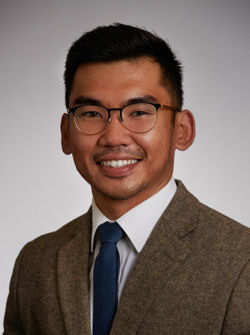By Daniel Pineda
“Try to exercise more.”
Those four words. I ended my visit with Mr. R, a young man newly diagnosed with diabetes, with those four words. As I stepped out of the room, I felt a bit uneasy and unfulfilled after the visit. I turned back into his exam room.
“How many people have told you to exercise more?”
He smiled and shrugged his shoulders.
“Has anyone ever showed you how?”
He smiled again. Then shook his head.
We spent the next 5 minutes learning the basics of a body squat and how we could best incorporate it into his daily life.
I have had the privilege of being a medical student among a primary care team at our urban hospital's charity care clinic, where we manage the care of uninsured, low socioeconomic status patients. I have also been able to work alongside our primary care physicians in numerous outpatient settings over the years, where patients from all walks of life have stepped in for health visits.
Countless times, I have said those four words without any follow-up. Countless times, I witnessed other providers say those four words without any further instruction. Countless times, patients walked out of the office feeling overwhelmed, without direction on how specifically to exercise more.
Patients seek their physicians, and especially their primary care providers, for health advice. We spend a decade or so of our lives learning about disease pathology and treatment so that our patients can feel comfortable with us managing their health care. Yet, the topic of exercise—a major contributor to overall health—is lacking in our medical education.
Evidence persistently shows the numerous benefits of exercise, so it is our responsibility to advocate those four words to our patients. However, how can we advise the unmotivated, overweight individual with no exercise experience to exercise more? We need to do more than say those four words. We need to learn, live, and understand.
We need to learn. We have many self-directed resources available to us, such as the American College of Sports Medicine's Exercise is Medicine initiative (1). We can learn varying exercise modalities and how to incorporate them into our patients live. By being willing to learn, we can be there to help guide our patients on how to start their exercise journeys.
We need to live it. It is undoubtedly easier to advocate life decisions to our patients if we ourselves have also experienced what we are advocating. How often do we tell our patients about past relatable situations (such as a family member who we convinced to get a colonoscopy) to help motivate their health care decisions? We are the model advocates of health for our patients. If we hope for our patients to live healthier, more active lives, we must do the same.
We need to understand. Two patients with osteoarthritis, one with a stable income and the other unemployed and on disability, both need to exercise but are in vastly different situations. Through holistic, integrative care, we can work together with our patients and determine individualized, goal-oriented exercise prescriptions.
Mr. R followed up with me a month later in the clinic. He came and sat in a chair, remaining quiet and keeping to himself as usual. His visit was nothing out of the ordinary, and we finished with a clear plan for his oral antihyperglycemic agents and diet management. As I was finishing the visit, I gave him a handout with exercise tips for individuals with diabetes (2) and asked him how his squats were going.
Without hesitation, he stood up and showed me a mechanically pristine, functional body squat.
I left the room feeling fulfilled, knowing that I did more than just say those four words.
References
- American College of Sports Medicine. Exercise Is Medicine. 2021. Accessed at www.exerciseismedicine.org on 9 February 2021.
- American College of Sports Medicine. Being active when you have diabetes. Exercise Is Medicine. 2019. Accessed at https://www.exerciseismedicine.org/assets/page_documents/EIM_Rx%20for%20Health_Diabetes%20(2).pdf on 9 February 2021.

Daniel Pineda is a fourth-year medical student at Cooper Medical School of Rowan University in Camden, New Jersey. He is interested in primary care and aims to emphasize holistic, integrative preventive care in his future practice.
Back to the February 2022 issue of ACP IMpact

